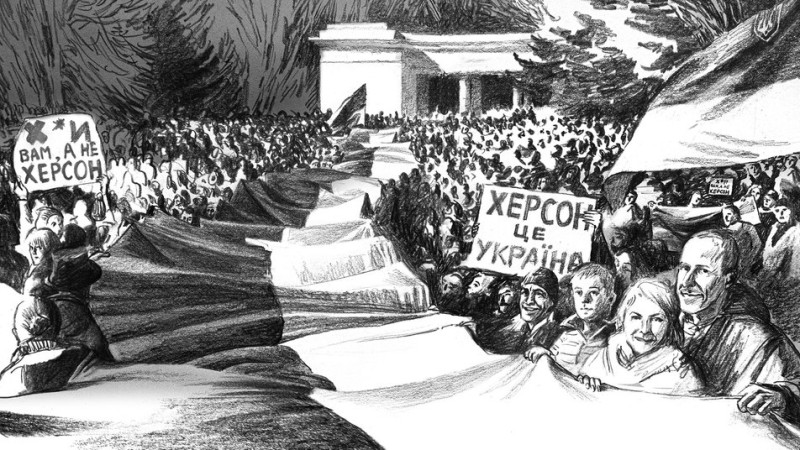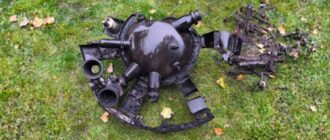
In the first months of the Russian invasion, pro-Ukrainian rallies were still held in the already occupied Kherson. The attitude of the occupiers towards the locals changed when they realized that the Kherson people were not happy with the «liberators». In the spring of 2022, the whole Barchuk family went to the rallies. Illustration by Inga Levi
This story began in 2022. When Russia attacked Kherson, Serhii Barchuk, who worked at the Pension Fund, decided not to leave the city and stay in his job. After the occupation of the city, he was detained and later disappeared. Serhii’s father and wife, as well as his uncle and a close friend started looking for him. Finally, they all ended up in prison.
On the one hand, the story of the Barchuk family is unique as the occupiers held four family members and a close family friend hostage for a year and threatened them with prison terms. On the other hand, this is a typical story. Hundreds of such stories took place during the occupation.
Tetiana Katrychenko, the human rights activist and executive director of the Media Initiative for Human Rights, explains, "Mostly people are detained for behaving differently than the occupation authorities expect. For example, a person writes something on social networks, then this person is accused of terrorism or sabotage and detained in order, first, to isolate, and second, to intimidate others.
The majority of such detainees are transported through the occupied Crimea to the Russian Federation. Alternatively, they are kept in Crimea. For example, several dozen Ukrainians are now being kept in Simferopol pre-trial detention centers No. 1 and No. 2.
A person can be released then, but already intimidated after torture. There were cases when people were detained for 30 days, and then taken to the demarcation line and "deported" with the prohibition of the entry to the territory of the Russian Federation for 50 years. There is also a practice of extrajudicial executions.
The case of the Barchuk family falls under the definition of political prisoners. In this way, it is typical for the occupied territories."
Artem Barchuk, "We are a big family, and we always help each other"
We met with 62-year-old Artem Barchuk in one of the Kyiv bowling clubs where he trains several times a week. Before the full-scale invasion, Artem headed the Sports Bowling Federation in Kherson. "This is a strong sports family," he says. "While we were in prison, they helped us, including with money." At the same time, the man adds, in one of the places of detention there was a man among the guards, whom Artem recognized as a player from Kherson. "He was from the amateur league, that collaborator," Barchuk smiles.
In Kherson, Artem had a family business — the Barchuks were selling tableware for restaurants and cafes. However, after the beginning of the full-scale invasion, the family had to quit the business. "The Russians came to Kherson just in a few days after the start of the great war, so we did not even have time to think what to do," the man says. "We bought food, medicines and moved with Lidia (Lidia Podozerska is Artem’s wife — ed.) to a country house on the bank of the Dnieper, it was quieter there."
Artem recalls how the people of Kherson went to rallies against the occupiers, "The Russians had confused faces because they came to liberate the local population and met such a resistance!" He says that at first, Russians behaved more or less normally, but then it changed. They began to disperse rallies, searched houses. People began to disappear in the city. Female and male screams could be heard from "Stekliashka" (an improvised detention center at the wholesale base in the northeast of the city), where the occupiers organized a torture chamber.
"After one of the rallies, the Russians arrested our friend, a veteran of the anti-terrorist operation, and took him somewhere. A few days later, he returned crippled and demoralized. The man was broken. He had experienced terrible torture," says Artem.
Before talking about the year in captivity, the man clarifies, "We are a large and friendly family. In addition, we have friends with whom we have been in touch for 40 years and they are already part of our family. Without their support, it would have been more difficult for us to survive imprisonment."






